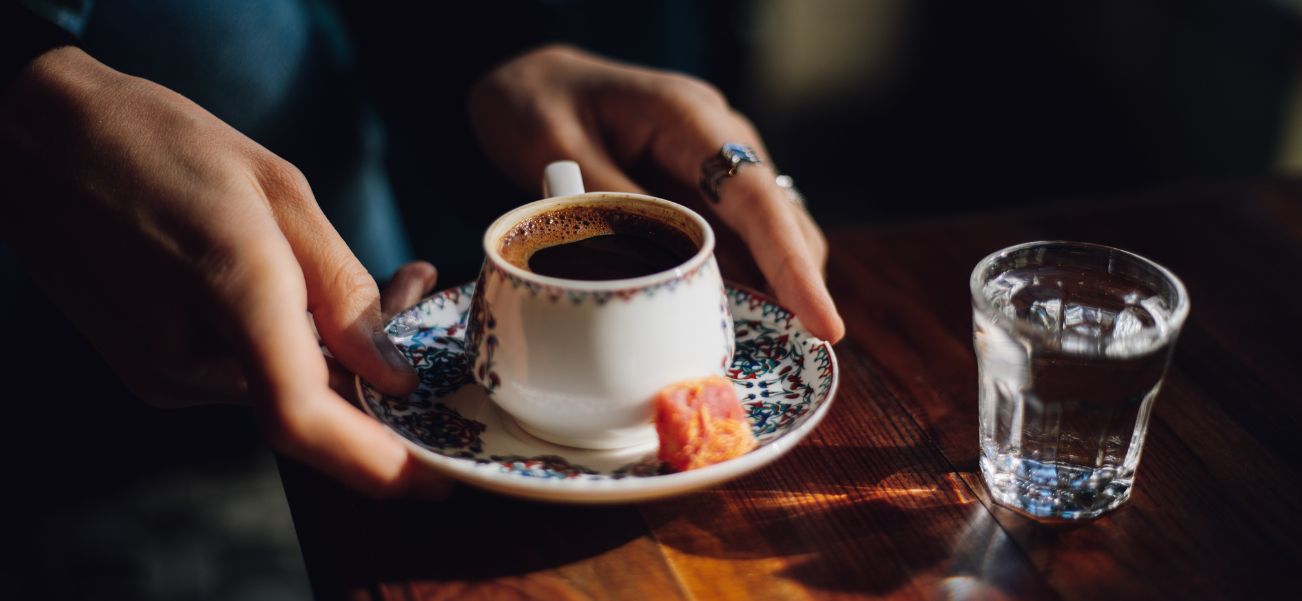
Cultural Importance of Turkish Coffee: Beyond the Cup
Steaming, fragrant, and steeped in tradition, Turkish coffee is far more than a mere beverage. It is a timeless ritual, a symbol of profound hospitality, and a social institution woven into the very fabric of Turkish and Ottoman heritage for over five centuries. The entire experience—from the meticulous grinding of beans to a fine powder, to the slow simmering in a distinctive "cezve", and the patient waiting for the grounds to settle—is a deliberate art form designed to foster connection and meaningful conversation.
More than just a drink, it is a reason to gather, a medium for fortune-telling, and a cherished custom offered to guests as a sign of respect. Recognized by UNESCO for its intangible cultural heritage, Turkish coffee transcends the cup, embodying a rich history of community, ceremony, and the profound importance of savoring life’s simple, yet deepest, pleasures.
In this article, we’ll explore:
- The history of Turkish coffee and how it became a cultural treasure
- The art of preparation and why the method matters
- Its role in social rituals, hospitality, and even marriage traditions
- How Turkish coffee fortune-telling (fal) keeps the tradition alive today
- Why UNESCO declared it an Intangible Cultural Heritage of Humanity
CULTURAL SIGNIFICANCE OF TURKISH COFFEE RITUAL
Turkish Coffee: A Journey Through History and Flavor
1. A Drink Steeped in History: The Origins of Turkish Coffee
From Yemen to the Ottoman Empire
Turkish coffee’s story begins in the 16th century when Ottoman governor "Özdemir Pasha" discovered the drink in Yemen and introduced it to Sultan Suleiman the Magnificent. The Sultan’s court fell in love with its rich aroma and stimulating effects, leading to the opening of the first coffeehouses in Istanbul (then Constantinople) in 1554.
Coffeehouses: The Birthplace of Ideas
These early coffeehouses, called "kıraathane" (reading houses), quickly became social hubs where people gathered to discuss politics, literature, and art. Unlike European taverns, which served alcohol, Ottoman coffeehouses fostered intellectual exchange—so much so that some sultans temporarily banned them, fearing rebellion!
Turkish Coffee 101: A Beginner's Guide to This Timeless Tradition
A Global Influence
The Ottoman method of brewing finely ground coffee in a cezve (ibrik) spread across Europe, influencing brewing traditions in places like Greece (Greek coffee), the Balkans, and even Vienna (thanks to the Ottoman siege of 1683).
2. The Art of Preparation: More Than Just Brewing
Turkish coffee isn’t just made — it’s crafted. The process is meticulous and remains largely unchanged for centuries.
Key Steps in Brewing Turkish Coffee
- The Beans Finely ground to a powder (finer than espresso).
- The Water Measured per cup (traditionally with a demitasse cup).
- The Cezve (Ibrik) A small copper or brass pot where coffee, water, and sugar (optional) are mixed.
- The Foam (Köpük) The hallmark of a well-made Turkish coffee—slowly heated to form a thick foam.
How to Make Authentic Turkish Coffee: Mastering the Brew
Serving Ritual
- Served in small cups with a glass of water (to cleanse the palate).
- Always accompanied by something sweet (lokum/Turkish delight or chocolate).
- Never stirred after serving—sediment settles naturally.
FUN FACT The phrase "A cup of coffee is remembered for 40 years" reflects the Turkish belief that sharing coffee creates lasting bonds.
3. A Symbol of Hospitality and Social Bonds
The Ultimate Gesture of Welcome
In Turkey, offering coffee is a sacred act of hospitality. Refusing it can be seen as rude, and hosts take pride in preparing it perfectly. A famous Turkish proverb says:
"Bir fincan kahvenin kırk yıl hatırı vardır." "The memory of a single cup of coffee lasts forty years."
Coffee in Marriage Traditions
Turkish coffee even plays a role in **matchmaking** and weddings:
- Kız isteme (Asking for the bride’s hand) The groom’s family visits the bride’s home, and she serves Turkish coffee—sometimes "salty coffee" as a playful test of the groom’s reaction.
- Engagement ceremonies Coffee is served as a symbol of union.
4. Fortune-Telling: The Mystical Side of Turkish Coffee
One of the most enchanting traditions is reading coffee grounds (tasseography or "fal"). After drinking, the cup is overturned onto the saucer, and the patterns left by the grounds are interpreted.
Common Symbols & Meanings
- Heart or Ring Love or marriage
- Bird Good news
- Snake An enemy or betrayal
- Tree Long life and prosperity
DID YOU KNOW? Some professional "falci" (fortune tellers) in Istanbul specialize only in coffee readings!
5. UNESCO Recognition: Protecting a Cultural Heritage
In 2013, UNESCO added "Turkish Coffee Culture and Tradition" to its Intangible Cultural Heritage List, recognizing its role in:
- Social bonding (bringing people together)
- Oral traditions (storytelling, proverbs, and fortune-telling)
- Preserving craftsmanship (handmade cezves, copper artisans)
This designation ensures that the tradition is passed down to future generations.
6. Turkish Coffee in the Modern World
While Starbucks and espresso machines dominate global coffee culture, Turkish coffee retains its charm:
- Specialty cafés in Istanbul (like "Mandabatmaz") keep traditional methods alive.
- Modern twists include flavored versions (cardamom, mastic gum).
- Global appreciation From Brooklyn to Berlin, Turkish coffee workshops and tastings are gaining popularity.
Conclusion: More Than a Drink—A Living Tradition
Turkish coffee is a ritual, a storyteller, and a bridge between past and present. Whether you’re sipping it in a Grand Bazaar café, participating in a fortune-telling session, or brewing it at home, each cup carries the weight of history and the warmth of Turkish hospitality.
Next time you drink Turkish coffee, remember — you’re tasting centuries of culture in every sip.














